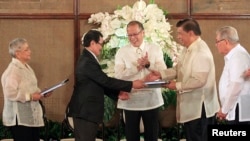A proposal that would give the Philippines’ largest Muslim rebel group the right to self-rule is now in the hands of lawmakers. Efforts to end four decades of conflict that killed 120,000 in the country’s restive Muslim-majority south have progressed in recent years and led to this week’s draft law, which still faces key obstacles.
Analysts say Philippine President Benigno Aquino’s office gave the proposed “Bangsamoro Basic Law” a thorough inspection before sending it on to Congress this week.
Asia Foundation Philippine Country Director Steven Rood said the president took a crucial time-consuming step.
“[So] that he could use all his political capital to insist it pass. And given that, the basic outlook for getting a bill passed is quite good,” said Rood.
Rood said the administration worked hard to ensure the bill adheres to the constitution.
The memory of the failed 2008 memorandum of agreement is fresh in many people’s minds. Six years ago, the Supreme Court struck down as unconstitutional the memorandum that addressed ancestral domain, which prompted two top commanders of the Moro Islamic Liberation Front to wage war on Christian-settled areas. Hundreds died and more than 500,000 people were displaced.
Rood said the current proposal is also expected to face challenges in the Supreme Court.
The Bangsamoro Basic Law calls for a parliamentary form of government in Muslim-majority Mindanao. The measure is meant to address years of fighting between rebels and government forces that have left the area economically depressed and virtually lawless.
The new autonomous region is being called Bangsamoro, a term coined by the rebels to identify Muslims and non-Muslims who call the region home. (“Moro” is the word Spanish colonizers used to describe Muslims).
The draft would give the region wide-ranging powers, including the ability to generate revenues, form a police force that would be part of the national law enforcement system and manage Islamic banking under the central bank’s regulation. The central government would be responsible for national defense, foreign affairs and monetary policy, among other central powers.
Ramon Casiple, executive director of the Institute for Political and Electoral Reform in Manila, said there is “a critical mass” to pass the bill, but not without debate.
“There will be two conflicting sides here. Those that really want to restrict the powers and the authorities of the new Bangsamoro entity, and those that really want it expanded,” said Casiple.
For Mussolini Lidasan, just getting the proposal into the halls of Congress is an accomplishment. Lidasan, head of the Al Qalam Institute of Ateneo de Davao University, is a peace worker and native of Maguindanao, a MILF stronghold.
“We know that most of the people in Congress don’t know the history of this whole thing. So it will be a huge task for peace advocates, for civil society organizations or even academics to engage our congressmen,” said Lidasan.
Lidasan said the administration will have to tread carefully because some could liken the proposal to a sort of constitution in itself, “in terms of territory and all other provisions of the law.” Furthermore, he expects opposition from smaller Muslim factions, such as the Sultanate of Sulu, which says its claim to Sabah in neighboring Malaysia is not addressed in the proposed region.
Nonetheless, Lidasan, who grew up in a community where guns frequently settle disputes, supports passage of the bill. And he hopes it will withstand the high court’s scrutiny. Lidasan said the Muslims’ quest for self-determination has been discussed since the early 1900’s when the Philippines was under American rule.
“And now we are in 2014 and we’re still trying to address the Moro problem. So we’re hoping this one would be the last and the final peace agreement for the Bangsamoro people, otherwise we cannot move on,” said Lidasan.
The administration is on a tight schedule to have the new Bangsamoro region in place in time for 2016 national elections. Before then, the law has to pass Congress, surmount challenges in the Supreme Court and survive a referendum for the residents of that region.






